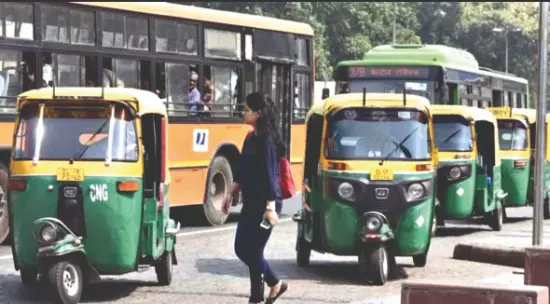
NEW DELHI, April 8 -- The Delhi government is gearing up for a major shake-up in its transportation ecosystem with the upcoming Electric Vehicle (EV) Policy 2.0, which proposes sweeping changes aimed at slashing vehicular emissions and improving air quality. The draft policy, currently under review before its expected tabling in the Cabinet, has laid out an aggressive roadmap to transition the Capital away from fossil fuel-powered transport, beginning with CNG autorickshaws and extending to petrol and diesel two-wheelers in the near future.
A central recommendation in the policy is the complete ban on registration of CNG-run autorickshaws from August 15, 2025. Moreover, existing permits for CNG autos will not be renewed beyond this date. Instead, these permits will only be re-issued as electric auto permits. For vehicles over a decade old, retrofitting or mandatory replacement with battery-operated models will be enforced during the policy period. The proposed policy also turns its attention to two-wheelers, one of the largest contributors to Delhi's vehicular pollution. Starting August 15, 2026, the registration of two-wheelers running on petrol, diesel or CNG will not be permitted. A similar deadline of August 15, 2025, has been proposed for banning fossil fuel-based three-wheeler goods carriers.
In addition to private transport, the policy aims to electrify Delhi's public and municipal fleets. It mandates that all garbage collection vehicles owned or leased by the MCD, NDMC, and Delhi Jal Board must transition to electric by December 31, 2027. Likewise, public buses operated by Delhi Transport Corporation (DTC) and Delhi Integrated Multi-Modal Transit System (DIMTS) will switch entirely to electric for intra-city routes. Only BS-VI compliant diesel buses will be permitted for inter-state services.
Another key proposal aims to discourage excessive private vehicle ownership. If a household already owns two vehicles, the purchase of a third will be permitted only if it is an electric vehicle. This clause, officials said, will be activated once the policy is formally notified.
Although the Delhi government has extended its existing EV policy by 15 days following its March 31 expiry, officials say this will be the final extension.
While the policy's tough stance on phasing out conventional vehicles has triggered debate online, with critics calling it "undemocratic", officials have clarified that the recommendations are still under review and may be amended during Cabinet approval. Nonetheless, the policy signals Delhi's most ambitious push yet towards sustainable
urban transport.
Published by HT Digital Content Services with permission from Millennium Post.
